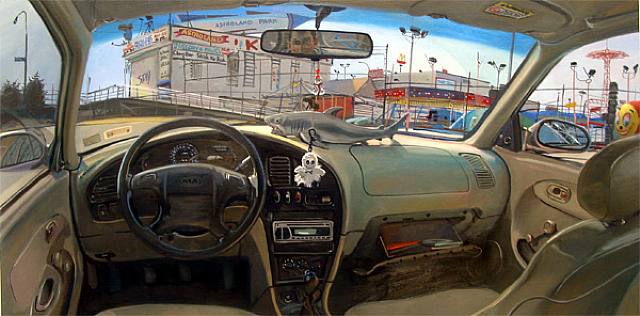When I write my first draft, I write bare-bones. Only what I need. The next draft, I fill in some of the little details or descriptions.
One thing that irritates me when I read a novel is the constant interruption in action to describe things. If a woman is being shot at, I don't need to know her shirt is red or that she's shorter than her sister who was born in the Yucatan and only likes to drink beer.
Description is important but you can create powerful images without disrupting the flow of dialog, action and conflict.
How?
1) Paint the image in small bites - if a woman is running through the forest, don't stop action to describe the trees and the birds and the fact that the forest is known for its conifers.
Better example: As she escaped through the woods, pine branches lashed her face. (you know you're running through a forest of pines, close together.)
2) Incorporate image into the action - Have the character describe not the author.
Better example: She pointed in the direction of the looming hulk in the pitch black of night. 'Did you hear that?'
'No,' he said, 'it couldn't be...'
The crashing of brush told them it could.
3) See through the character's eyes.
4) Don't describe the cliche, the norm, describe telling details - When describing the forest, don't just describe the eerieness of the trees and the shadows...that's been done. Instead, describe a spider's web that the character got caught up in or ran into or maybe a startled rabble of butterflies fluttered off the tree in front of her face and the dust from their wings made her sneeze.
5) Choose better verbs.
6) Make verbs into better adverbs - Looming could be an adjective or crashing could be a noun. Love your thesaurus and your dictionary!
7) Invent fresh viewpoints - describe the scene as a blind person feels it. Or as a deaf feels it.
8) Create an image without saying so - 'She threw her Kindle across the room, breaking the glass on her father's platinum album award' says a lot about the character, a) she's into technology b) has anger issues c) doesn't value her possessions d) is rich e) her father is a musician f) a famous musician g) she likes reading
Picture source: here
From Fiction Writers Brainstorm
Subscribe to:
Post Comments (Atom)





















12 comments:
This was brilliant!!! Awesome post! Thanks for all the insight! I love taking in all the information I can get!
Thanks for all of the great tips. I'll be sure to put them to good use! ; )
Nice post, Ann! I've tweeted it...
Elizabeth
Very useful post, I need to follow this advice.
But...she threw her Kindle across the room?! I guess she must be insane. I would never throw my Kindle ;-)
Great advice! If anything I have to go back in and add description :)
Jen, thanks, glad you like the post.
Kimberley, I know I'll be checking back to make sure I use these points too.
Elizabeth, thanks for tweeting.
Other Elizabeth, i guess I can add insanity to the mix.
Jemi, you're like me, add description last.
ann
Great post and very helpful, inspiring tips! Thank you for sharing:)
Lua, you're welcome. Glad you like it.
ann
Great advice, thanks!
Lisa, glad you liked it.
ann
#4 in particular inspires me.
Thanks for sharing more writing tips!
Corra
from the desk of a writer
Corra, glad you liked Number 4
ann
Post a Comment